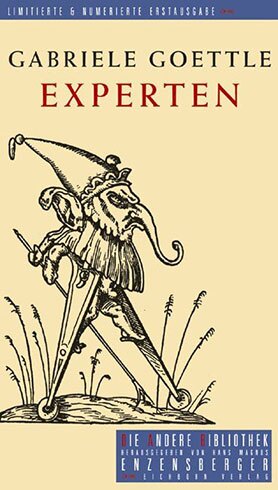Gabriele Goettle
Experten
[Experts]
- Eichborn Verlag
- Frankfurt am Main 2004
- ISBN 3-8218-4546-5
- 434 Pages
- Publisher’s contact details
Gabriele Goettle
Experten
[Experts]
Sample translations
Review
Once a month for many years now Gabriel Goettle has published portraits of remarkable contemporaries in the German daily “tageszeitung” (taz). In her column “Freibank - Kultur minderer Güte, amtlich geprüft” [Cheap Meat Stall - Second Class Culture, officially approved] she introduces people, who have committed themselves in an exceptional way to an idea or project, who reflect on what they are doing, people whom it is definitely a gain for the reader to get to know. Collections of these portraits have already appeared in book form - “Experts” is the most recent of these. In it Gabriele Goettle presents thirty two people, who are undisputed experts in a wide range of fields. Some are well-known scholars, others are engaged in quite familiar, practical kinds of work.
The portraits always take the same form, proceeding from the general to the particular to the personal. A picture of each person, taken at one of the interviews heads each section, together with an abbreviated biography, providing the bare facts of the curriculum vitae. The actual portrait essay then begins with a brief introduction to the particular special field allowing the reader to make sense of the more detailed observations that follow.
In some cases this introductory section sketches the historical background, in others the author explains the importance of the field of research or work of the interviewee in the overall context of scholarly or social discussion.
This is followed by the first meeting with the person interviewed, usually at a work place or at least in a more public environment. Goettle starts with her first impressions, giving the reader the feeling of being there. She doesn’t report what was said, but describes the person she is talking to, how he or she appears in their professional surroundings and how he (or she) talks about them. In this way Goettle conveys a vivid picture of the speaker and of his relationship to his work. After this initial, relatively formal acquaintanceship, the interview proper takes place at a second meeting, in more private surroundings, either in the home of the person being portrayed or perhaps in a cafe of his or her choice. Here Goettle allows her interlocutor “free rein”, only occasionally asking short questions or making brief remarks, with which she often draws astonishingly impassioned speeches from her interviewees. Almost incidentally Goettle repeatedly manages to reveal in most of her studies the passionate commitment, which has “made” experts of her subjects.
So who are the “experts”, who have their say in this book? About half of those questioned are scholars in a variety of disciplines. In addition to a number of natural scientists researching problems in theoretical and experimental physics or pure mathematics there are also members of more practice-oriented professions such as a criminal biologist or an abattoir vet. As representatives of the humanities and social sciences the reader encounters the critic of society Ivan Illich or the ethnopsychoanalyst Paul Parin. The other half of the interviewees are made up of completely practical professions, such as a midwife, bomb disposal expert or tailor to the famous. Among these there is also a small group of genuinely exotic careers, for example, that of high-wire acrobat. All those portrayed have in common not only an unusually profound knowledge of their particular field, but also, with a few exceptions, the enthusiasm, with which they talk about their work.
Gabriele Goettle’s interview technique is pleasingly low key, and it’s sometimes easy to forget, that she is present at all. She invariably describes the surroundings, the offices and laboratories, the living rooms and studies, in which the meetings take place, with a practised eye for detail. No matter how different their furnishings and the aesthetic preferences of their occupants may be, Goettle’s descriptions always maintain a - sometimes mischievous - distance and are never judgemental. Whether her interlocutor is a sewerage worker or a theoretical physicist, whore or snowball manufacturer: thanks to the unfeigned, sympathetic eye of a sensitive interviewer the most diverse ways of life and kinds of work are revealed to the reader, including some of which he had never heard of before.
Gabriele Goettle’s portraits of experts are “at home stories” in the best sense and are never prying.

The portraits always take the same form, proceeding from the general to the particular to the personal. A picture of each person, taken at one of the interviews heads each section, together with an abbreviated biography, providing the bare facts of the curriculum vitae. The actual portrait essay then begins with a brief introduction to the particular special field allowing the reader to make sense of the more detailed observations that follow.
In some cases this introductory section sketches the historical background, in others the author explains the importance of the field of research or work of the interviewee in the overall context of scholarly or social discussion.
This is followed by the first meeting with the person interviewed, usually at a work place or at least in a more public environment. Goettle starts with her first impressions, giving the reader the feeling of being there. She doesn’t report what was said, but describes the person she is talking to, how he or she appears in their professional surroundings and how he (or she) talks about them. In this way Goettle conveys a vivid picture of the speaker and of his relationship to his work. After this initial, relatively formal acquaintanceship, the interview proper takes place at a second meeting, in more private surroundings, either in the home of the person being portrayed or perhaps in a cafe of his or her choice. Here Goettle allows her interlocutor “free rein”, only occasionally asking short questions or making brief remarks, with which she often draws astonishingly impassioned speeches from her interviewees. Almost incidentally Goettle repeatedly manages to reveal in most of her studies the passionate commitment, which has “made” experts of her subjects.
So who are the “experts”, who have their say in this book? About half of those questioned are scholars in a variety of disciplines. In addition to a number of natural scientists researching problems in theoretical and experimental physics or pure mathematics there are also members of more practice-oriented professions such as a criminal biologist or an abattoir vet. As representatives of the humanities and social sciences the reader encounters the critic of society Ivan Illich or the ethnopsychoanalyst Paul Parin. The other half of the interviewees are made up of completely practical professions, such as a midwife, bomb disposal expert or tailor to the famous. Among these there is also a small group of genuinely exotic careers, for example, that of high-wire acrobat. All those portrayed have in common not only an unusually profound knowledge of their particular field, but also, with a few exceptions, the enthusiasm, with which they talk about their work.
Gabriele Goettle’s interview technique is pleasingly low key, and it’s sometimes easy to forget, that she is present at all. She invariably describes the surroundings, the offices and laboratories, the living rooms and studies, in which the meetings take place, with a practised eye for detail. No matter how different their furnishings and the aesthetic preferences of their occupants may be, Goettle’s descriptions always maintain a - sometimes mischievous - distance and are never judgemental. Whether her interlocutor is a sewerage worker or a theoretical physicist, whore or snowball manufacturer: thanks to the unfeigned, sympathetic eye of a sensitive interviewer the most diverse ways of life and kinds of work are revealed to the reader, including some of which he had never heard of before.
Gabriele Goettle’s portraits of experts are “at home stories” in the best sense and are never prying.
Translated by Martin Chalmers

By Heike Friesel
